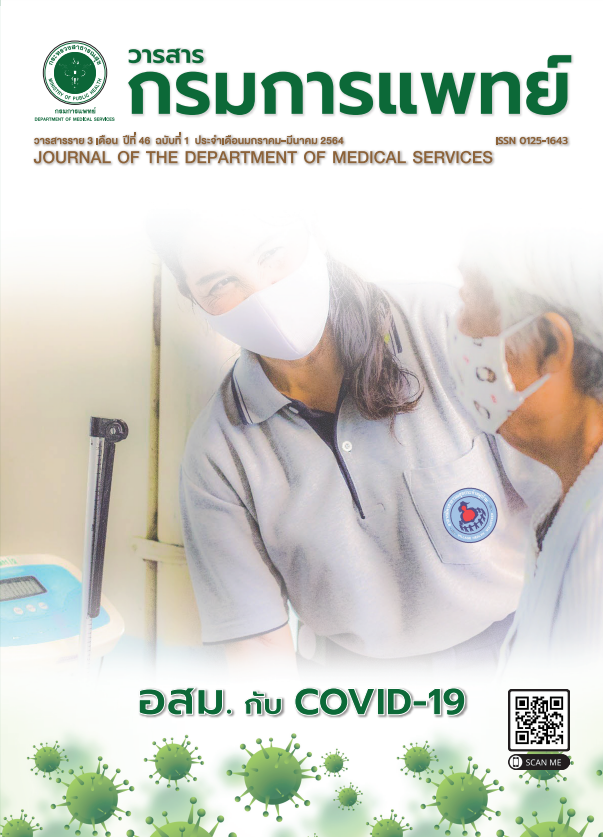Development of Nutrition Knowledge-based Learning Model by Information Technology for Blood Sugar Control among Diabetic Patients
Keywords:
Nutrition knowledge-based learning model, Information technology, Blood sugar control, Diabetic patientAbstract
Background : The development of educational tools for behavior change in diabetes patients is widespread. However, the educational model using the mobile application for DM control is limited.Objective : To develop and evaluate the nutrition knowledge-based learning model (classify food) for blood sugar control among diabetic patients in Rajavithi Hospital.Methods : The research and development was carried out in two phases. First: The situation analysis to develop a nutrition knowledge-based learning model using information technology was performed by multidisciplinary brainstorming. Second: A quasi-experimental study was performed to evaluate outcomes including FBS, HbA1c, knowledge to classify food types, and satisfaction. Eighty diabetic patients were equally assigned into two groups. The experiment was given classify foods application via smart devices. The application is a colorful figure with music. Touching with fingertips to move each figure along the point of each food type. Three food types were classified as unlimited intake, limited intake and forbidden foods. A trial took 90 seconds per cycle, and correct answer scores were recorded. The comparison group received pre-and post- knowledge paper assessment, nurses and nutritionists gave counseling for both groups. To follow-up, the team called both groups for lifestyle modification. FBS and HbA1c were measured at baseline and three months. Independent t-test and Paired t-test were used to compare outcomes between groups and before-after the trial. This study was reviewed and approved by the research ethics committee, Rajavithi hospital.Results : Classify food application model via Android was initiated. The characteristics of both groups were similar. The experiment group had significantly better knowledge about food classification than before the study and better than the comparison group (p=0.035). After the trial, average FBS and HbA1c in the experiment group were significantly lower than those before the trial, and significantly lower than those of the comparison group (p=0.041 and p=0.048). The experiment group had higher satisfaction scores than those of a comparison group (p<0.001). Attractive style, better knowledge, modern model, and ease to use were the main reasons for classifying food at the most satisfactory level.Conclusions : The classify food game model is an effective learning tool that significantly improved FBS and HbA1c in diabetic patients. Further investigation should apply this model for the long term to manage proper dietary behavior and control blood sugar levels. Exercise and emotional management should add to the application.
References
Diabetes Association of Thailand under The Patronage of HerRoyal Highness Princess Maha Chakri Sirindhorn. Clinical Practice Guideline for Diabetes 2017. 2nd edition. Phathum Thani: Romyen Media; 2017.
Aekplakorn W, Chariyalertsak S, Kessomboon P, Sangthong R,Inthawong R, PutwatanaP, et al. Prevalence and management of diabetes and metabolic risk factors in Thai adults: The Thai National Health Examination Survey IV, 2009. Diabetes Care 2011; 34: 1980-5.
Institute of Medical Research and Technology Assessment,Department of Medical Services. Data of Diabetes, Hypertension and Complication in Thailand; 2013.
The Expert Committee on the Diagnosis and Classification of Diabetes Mellitus. Follow-up report on the diagnosis and classification of diabetes mellitus. Clinical Diabetes 2004; 22:71-9.
Ratarasan C. The Diabetes Epidemic and Its Impact on Thailand.Endocrine and Metabolic Unit. Department of Medicine, Faculty of Medicine, Ramathibodi Hospital; 2013.
Siriwattanapornkul T, Oba N, Intarakumhang Na Rachasima S.Factors Related to Blood Glucose Level among Patients with Diabetes Mellitus Type II. Journal of Nursing Science Naresuan University 2007; 1: 57-67.
Chongchareon W, Kahawong W, Apichato A, Sangchandr O,Chukumneard P, Boonsin K, et al. A self-care promotion model for controlling blood sugar in type 2 diabetes. Songkla Med J 2008; 26:71-84.
Chantawuthinun T. Factors effective in lowering blood sugar levels of diabetes mellitus patients in the diabetes clinic of Saraphi hospital, Chiang Mai province. Journal of Health System Research 2008; 2: 1042-7.
Choomnui S. Factors effective in lowering blood sugar levels of diabetes mellitus patients in Rongkla hospital, Rongkla, Kalasilp province. Research and Development Health System Journal 2007; 1: 60-9.
Mungvongsa A, Therawiwat M, Tansakul S, Imamee N. A self-Efficacy Dietary Glycemic Control Program for Ptients with Type 2 Diabetes in Nakhon Pathom Province. Journal of The Department of Medical Services 2017; 42: 62-70.
Quinn CC, Shardell MD, Terrin ML, Barr EA, Ballew SH, Gruber-Baldini AL. Cluster-randomized trial of a mobile phone personalized behavioral intervention for blood glucose control. Diabetes Care 2011; 34:1934-42.
Saffari M, Ghanizadeh G, Koenig HG. Health education via mobile text messaging for glycemic control in adults with type 2 diabetes: a systematic review and meta-analysis. Prim Care Diabetes 2014; 8:275-85.
Kirwan M, Vandelanotte C, Fenning A, Duncan MJ. Diabetes self-management smartphone application for adults with type 1 diabetes: randomized controlled trial. J Med Internet Res 2013; 15:e235.
Rajavithi Hospital Statistics 2015-2017. Medical Records and Statistics, Technology and Information Division,Rajavithi Hospital.
Bernard R. Fundamental of Biostatistics. 5th edition. Duxbery:Thompson learning; 2000.
Sa-ard S. Development of Health Education Model Using by Self Directed Learning Media for Chronic Patients.Academic Services Journal Prince of Songkla University 2015; 26: 41-9.
Downloads
Published
How to Cite
Issue
Section
License

This work is licensed under a Creative Commons Attribution-NonCommercial-NoDerivatives 4.0 International License.
บทความที่ได้รับการตีพิมพ์เป็นลิขสิทธิ์ของกรมการแพทย์ กระทรวงสาธารณสุข
ข้อความและข้อคิดเห็นต่างๆ เป็นของผู้เขียนบทความ ไม่ใช่ความเห็นของกองบรรณาธิการหรือของวารสารกรมการแพทย์



